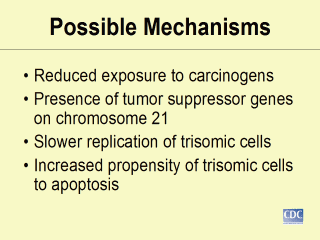| front |1 |2 |3 |4 |5 |6 |7 |8 |9 |10 |11 |12 |13 |14 |15 |16 |17 |18 |19 |20 |21 |review |
 |
Several possible mechanisms alone or in combination may explain the paucity of cancer among people with Down syndrome. Individuals with Down syndrome probably have decreased exposure to environmental factors such as tobacco smoke, alcohol, and certain occupational chemicals that increase the risk of developing cancer. Another possible reason may be related to tumor suppressor genes on chromosome 21. According to the two-hit hypothesis, both copies of a tumor suppressor gene need to be inactivated for a cell to become malignant. In the case of a tumor suppressor gene on chromosome 21 in a person with Down syndrome, three mutations would be necessary to knock out the gene's activity. Another possible reason may reflect the slower replication of trisomic cells, which has been demonstrated in vitro. A slower rate of replication may provide less opportunity for mutation of genes involved in tumorigenesis. Finally, trisomic cells that undergo mutation may have an increased propensity to apoptotic cell death. |